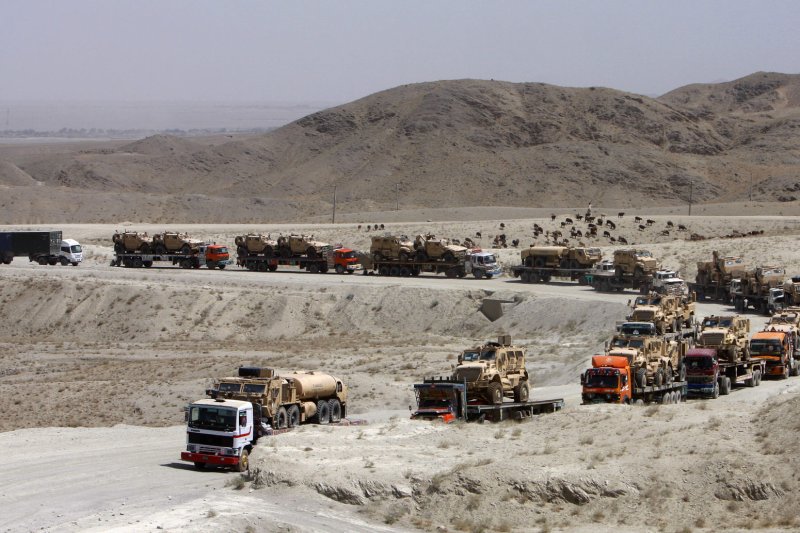Pakistani trucks carrying NATO and U.S military vehicles cross the Quetta Chaman highway at Kojak Pass border area after leaving the southern Afghanistan province of Kandahar near Chaman, Pakistan on July 25, 2013. The trucks head to the port of Karachi, Pakistan as the pullout continues, ending a NATO/USA decade-long military combat involvement in Afghanistan by the end of 2014. There are approximately 60,000 American troops in Afghanistan at present. UPI/Matiullah Achakzai |
License Photo
WASHINGTON, Nov. 29 (UPI) -- U.S. experts, writing separately in The New York Times and the Washington Post on Afghanistan, strongly criticized President Hamid Karzai's current stand.
Karzai has frustrated the Obama administration by making new demands before signing the bilateral security agreement, which took a year of hard negotiations before being approved last week by Afghanistan's Loya Jirga grand council of elders.
The United States wants the agreement to be signed before the end of this year so it can decide how many troops to keep in Afghanistan after U.S.-led NATO forces complete their withdrawal by the end of 2014. Karzai, however, has continued to stall on putting his signature on the deal.
Writing in the Times, retired U.S. Marine Corps Gen. John Allen, a former commander of the coalition forces in Afghanistan, and Michael E. O'Hanlon, director of research at the Brookings Institution, called Karzai's stand an insult to the United States, which has spent more than $600 billion and lost more than 2,000 of its forces in Afghanistan.
"The latest insult is his (Karzai's) decision to hold off on signing a bilateral security agreement ... on the grounds that his successor should have that prerogative next year."
The article said Karzai's new demands "just when we thought the security agreement was a done deal" include release of all Afghan detainees in the prison camp at Guantanamo Bay.
While noting some U.S. officials may have erred in talking openly about corruption in the Karzai government, the authors said there should be little doubt "Mr. Karzai's own peevishness and ingratitude have played a large role."
Allen and O'Hanlon warned it would be a mistake for U.S. officials to "let one man -- increasingly detached from Afghan public and political opinion -- determine the fate of the American role in South Asia." They warned the stakes remain high as extremist groups from al-Qaida to (Pakistan-based) Lashkar-e-Toiba could return to Afghanistan if the country were to fall to the Taliban after NATO's departure.
The article said the main candidates in Afghanistan's 2014 presidential election also want the United States to stay.
"In the end, this is about the American and the Afghan peoples, not about Hamid Karzai," it said.
The Washington Post article was written by John Podesta, former Clinton White House chief of staff and now chairman of the Center for American Progress; former Virginia U.S. Congressman Tom Perriello, and Caroline Wadhams, both at the same center.
Writing about their recent visit to Afghanistan, they said the people they met including civil society leaders, public officials, tribal elders, youth and women's groups expressed anticipation the security pact "would soon be signed, creating the security umbrella essential for a stable state."
On Karzai, the Post article said he "is making a self-serving and dangerous gamble, and Afghan lives are on the line," and that his "recklessness may undermine Afghanistan's political transition."
The article said if Karzai isn't willing to "act in good faith" and sign the pact by the end of this year, "the United States must be prepared to suspend all negotiations, begin planning for withdrawal of all U.S. forces by the end of 2014 and await the election of a new president to determine whether the deal can be finalized."















